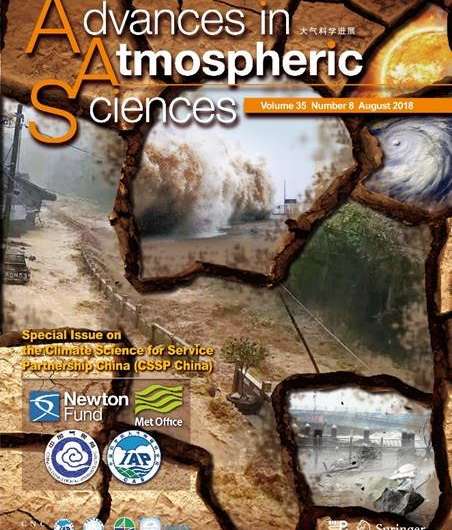Special issue to highlight climate science for service partnership between China and the UK

Now in its fifth year, with more than 100 scientific publications under its belt, the Climate Science for Service Partnership China (CSSP China) has helped improve understanding of the effects of climate change on society and is forging new ways to reduce the risks associated with climatic extremes.
Research highlights appear on June 7, 2018 in a special issue of Advances of Atmospheric Sciences, a journal published by Springer.
CSSP China was established in 2014, supported by the UK-China Research and innovation Partnership Fund, funded in the UK by the Newton Fund. CSSP China partners include China Meteorological Administration's Beijing Climate Centre and the Institute of Atmospheric Physics at the Chinese Academy of Sciences, the Met Office, as well as other key research organisations in China and the United Kingdom. CSSP China is part of a growing global network of partnerships within the Weather and Climate Science for Service Partnership Programme.
"Over the course of many years, the scientific community has made significant advances in observing and understanding our planet's day-to-day weather and the longer-term climate," said Prof Stephen Belcher, Met Office Chief Scientist and one of the coordinators for the collaboration. He is also one of the authors of the special issue's preface alongside Prof Peter Stott, Science Fellow at the Met Office.
"Alongside the scientific advances," Prof Stott said, "society is becoming increasingly aware of, and perhaps more vulnerable to, weather-related and climate-related risks, such as loss of life arising from extremes of temperature, precipitation, wind, or water levels."
The special issue includes research papers organized into five connected categories ranging from how to improve monitoring systems to understanding the global dynamics of climate variability and change, as well as the climatic extremes specific to East Asian climate. There is also research focused on knowledge application through the development of models and climate projection systems and the joint development of prototype climate services.
"Climate services are sources of climate information to enable economic development and social welfare to be resilient to variations and changes in climate," Prof Stott said.
CSSP China research on summer rainfall patterns in the Yangtze river basin led to significantly improved seasonal forecasting—an important feat for a flood-prone area where the inhabitants are at risk not only of losing their livelihoods, but their lives. CSSP China-supported research has also led to better assessment of crop security and resiliency, which has an obvious and direct impact on food supplies across the world.
"Through CSSP China we are building a joint framework that will be the foundation for future work together. I am confident that we can provide the information and support needed to help China and the UK to mitigate and adapt to the impacts of climate change," said Dr. Lianchun Song, one of the guest editors from NCC.
Dr. Riyu Lu, one of the guest editors from IAP, commented on the progress of CSSP China in the past five years: "The progress of CSSP China totally exceeds my expectation. I had thought it would take quite a while for British scientists to become familiar with regional climate over China, but it turns out the process has been considerably shortened through close cooperation and personnel visits in both countries; in particular, data and model sharing without any reservation has resulted in productive outcomes. The special issue only showcases some of the recent achievements, and I'm looking forward to even more exciting results in the next phase of our cooperation."
CSSP China partners are now working hard to translate more of their research findings into applicable services that can help inform policy decisions, as well as better inform society in terms of preparedness for natural disasters of immediate or gradual circumstances.
"The ultimate goal of CSSP China is to develop and apply scientific understanding in order to enhance the provision of climate and weather resilient economic development and social welfare in China and in the United Kingdom," Prof Belcher said.
More information: Stephen Belcher et al, Preface to Special Issue on Climate Science for Service Partnership China, Advances in Atmospheric Sciences (2018). DOI: 10.1007/s00376-018-8002-0
Provided by Chinese Academy of Sciences



















